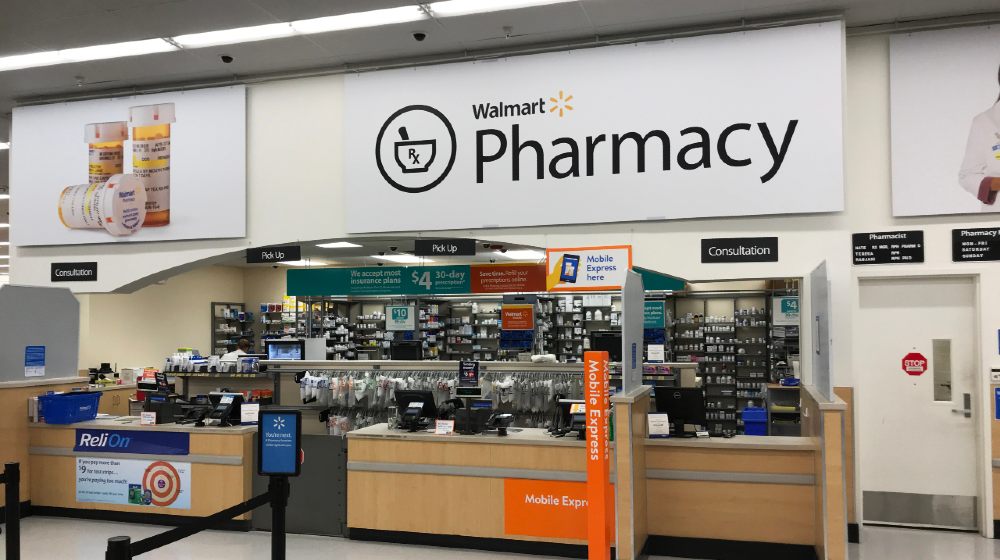Breaking News
DOJ Sues Walmart For Role in Opioid Crisis

This week, the DOJ sues Walmart Inc for violating the Controlled Substance Act. It sought billions of dollars in penalties and injunctive relief against the company. The Department charged Walmart for failing to screen prescriptions issued by questionable doctors. Then, Walmart allegedly boosted its pharmacy profits by understaffing its pharmacies. It also reportedly pressured employees to fill prescriptions quickly. Consequently, these management instructions made it difficult for pharmacists to reject questionable prescriptions.
RELATED: Walmart Launches “Walmart Insurance Services”
The DOJ alleges Walmart’s network of 5,000 in-store U.S. pharmacies made it a leading supplier of painkillers. The allegations dated back to June 2013, according to the suit. With Walmart locations spread nationwide, they helped enable drug abuse nationwide.
Walmart Responds to the Suit
Walmart replied that the lawsuit contains “factual inaccuracies and cherry-picked documents.” It alleged that the DOJ invented a legal theory that assumed too much from pharmacists. It “unlawfully forces pharmacists to come between patients and their doctors.” Allegedly, the government wants to blame their staff for not second-guessing DEA-approved doctors. In addition, Walmart said that this is a “transparent attempt to shift blame.” Plus, the DEA is full of “well-documented failures” in keeping bad doctors from prescribing opioids.
Want to see the full article
Click here to read the full article on thecapitalist.com
Also, the retail chain added it already empowered pharmacists to refuse questionable opioid prescriptions. In fact, they already rejected hundreds of thousands of such prescriptions.
Pre Emptive Suit Against the Government
Earlier this year, Walmart already expected the government to file a civil complaint. The company sued the federal government last October to head off the investigation. It charged that the feds attempted to scapegoat Walmart for the opioid issue. Instead of them, Walmart said that the government's own regulators are to blame. It claimed that around 70% of suspect doctors remain licensed to prescribe medications. This medical personnel still have valid DEA registrations.
In a statement, Walmart headed off a possible suit against them. They said the department shouldn't try to blame them for not screening prescriptions. Instead, they should look at the DEA and state regulators. They are the agencies that issue licenses to doctors that prescribe painkillers.
Second Guessing Doctors
Walmart also said they already blocked thousands of doctors from their system. The blacklist prevented them from getting their prescriptions filled at Walmart pharmacies. However, they drew the line at pharmacists taking over a federal responsibility. They said it was equal to asking them to second-guess doctors and regulators.
Walmart alleged that the suit places their pharmacists “between a rock and hard place.” State regulators already accuse Walmart of going too far in refusing prescriptions. Now, they want staff to second-guess doctors.
It’s Walmart’s Fault
Maria Chapa Lopez of the Tampa US attorney’s office blamed Walmart squarely. She said the glut of opioids is due to Walmart not performing its obligations. In addition, the pharmacies’ low prices on opioids attracted a lot of customers. Pharmacists, under pressure from company executives, received orders to work faster. Consequently, customers kept coming back to branches that filled their prescriptions fast.
Compliance Unit
The Justice lawsuit alleges that Walmart continually ignored warnings about understaffing its stores. The pressure to sell increased the chances for mistakes and put patients at risk. Meanwhile, Compliance managers allegedly gave little help to pharmacists. The suit alleges that managers didn’t share information between stores. Managers also declined to supply blanket requests to questionable doctors. This happened despite other chains already blacklisting them.
A Walmart compliance director wrote about the failure to “follow basic legal rules.” This in turn “helped fuel a national crisis.” The market directors should be analyzing refusal to refill reports. Instead, they focused on driving sales and patient awareness.
Aggressive Marketing
Governments say Walmart and other companies used aggressive marketing to drive opioid demand. This in turn led to a painkiller epidemic. As the DOJ sues Walmart, the latter and other national chains should start taking notice. They should also accept their role in helping combat the opioid crisis.
Around 50,000 cases of fatal opioid overdoses happened in 2019, which stands as a record high. The Centers for Disease Control and Prevention noted that the opioid crisis worsened in 2021. With the pandemic, more people began using painkillers. At the same time, the shutdown prevented health officials from making interventions.
Watch the CNBC new report where the Department of Justice sues Walmart:
Do you agree with the Justice Department saying that it’s Walmart who’s on the hook for rising opioid cases? Or, do you side with Walmart in saying they only fill prescriptions issued by DEA-approved doctors? Let us know which side you find more liable by sharing your opinion in the comment section below.












